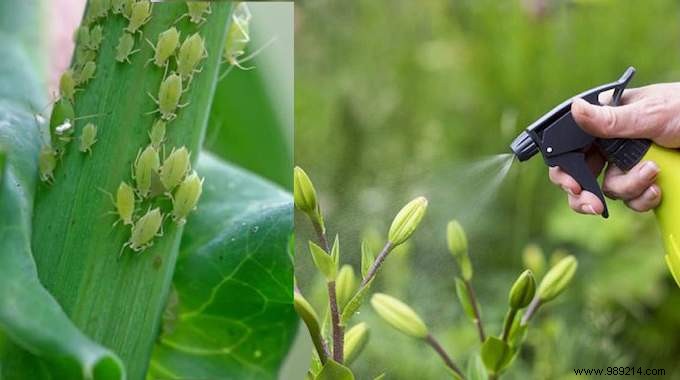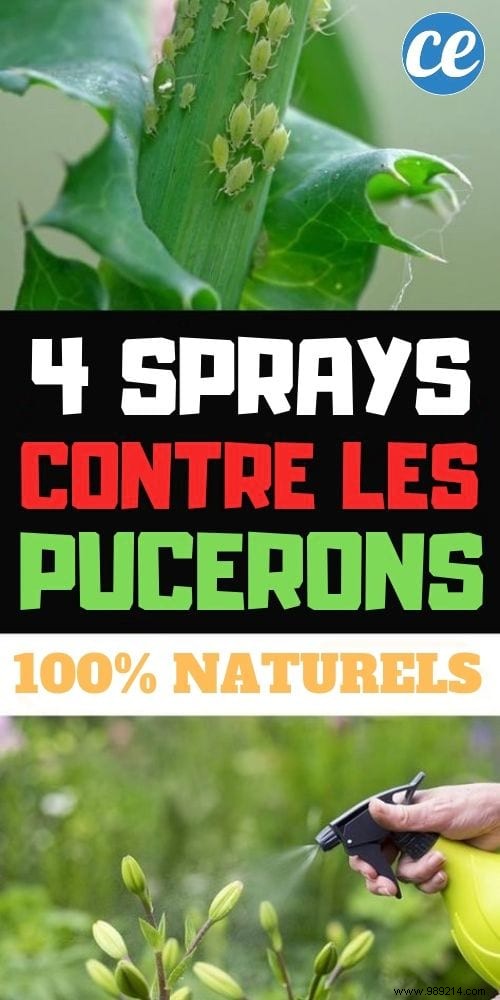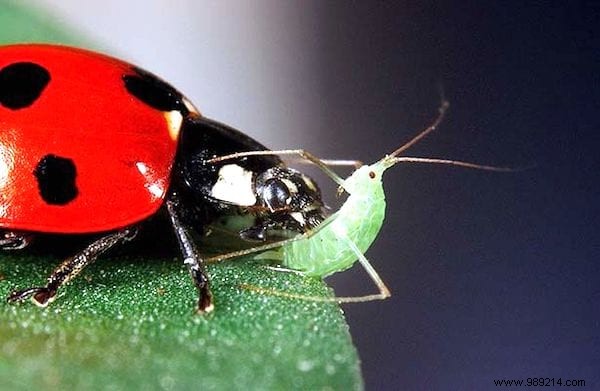
Aphids attack flowers and garden vegetables without shame.
With a little rain and sun, they swarm in a few hours and your garden is devastated...
Fortunately, to overcome it, we can avoid chemical solutions.
Indeed, there are simple and natural tips to get rid of aphids.
Here are 4 natural spray recipes that I use every year in my vegetable patch and garden against aphids . Watch:

As soon as you see that the aphids are installed, you must act quickly otherwise your plants risk a lot!
You can prepare one of these mixtures to spray on the affected plants. These remedies have the advantage of being organic and effective.
Did you know that garlic is a powerful anti-parasitic?
To prepare an aphid repellent, put 100 g of crushed garlic cloves in 4 liters of water and leave to macerate for 24 hours.
The next day, boil the mixture for 20 minutes to obtain a decoction.
Once cool, transfer the mixture to a sprayer and apply to infected plants, preferably on a day without rain.
Slice 100 g of onion and put them in 8 liters of water. Boil the mixture for 30 min.
Use this pure spray mixture without diluting it.
What's great is that this aphid spray also works against other plant diseases like fungal diseases.
Please note:this mixture cannot be stored. It must therefore be used during the day after having prepared it.
The dandelion is not just a "bad" grass, quite the contrary.
Indeed, it has many medicinal properties. But also anti-parasitic.
Put 400 g of dandelion greens in 10 liters of water.
Allow to macerate for at least 3 hours before spraying affected plants.
Thoroughly spray the entire plant, not forgetting the underside of the leaves.
Nettle is an often unloved plant, yet it is incredibly useful in the garden.
Put on gloves and pick about 1 kg of nettle leaves to make an anti-aphid spray. Prefer stems without flowers.
Macerate them in 10 liters of water for 24 hours.
Spray the pure macerate on your plants infested with aphids. At the same time, it will protect them from mildew or powdery mildew.
Another effective method is to put 1 kg of nettle leaves in 8 liters of water and leave to macerate for 2 to 3 weeks.
When the liquid turns light brown, spray on aphids by mixing 1 part nettle manure to 7 parts water.
You can keep nettle manure for a few weeks...but be careful, it stinks!
To discover :Nettle Manure:Recipe and Uses Your Vegetable Garden Will LOVE.

Like all natural treatments, some work better than others depending on the plant, the weather conditions or the extent of the aphid infestation. It is often necessary to start again several times before having an impeccable result. This is why we can combine these anti-aphid sprays with these natural tips:
Position the nozzle of your sprayer over a wide opening. Then, flood the infested leaves with large jets of water (without damaging the leaves). Aphids hate water. In addition, they will be carried away by the power of the jet.
Using essential oils can help get rid of aphids. The smell keeps them at bay. Add a few drops of peppermint or lavender to any of the recipes above.
If the infestation is still minimal, you can kill the aphids by hand. Put on a pair of gloves, and just crush them.
Soap, like black soap, is an excellent insecticide if mixed with one of the above preparations. Neem oil also works very well to intensify the effect of the 4 anti-aphid sprays.
Introduce ladybugs to infested areas as they eat aphids. Lacewings, praying mantises and hoverflies play the same role as ladybugs.
Ants and aphids work as a team in our gardens to destroy our plants. Why ? Because aphids secrete a sweet honeydew that ants love. So get rid of ants too to control the proliferation of aphids in your vegetable garden.
The best way to avoid aphids is not to grow plants that attract them.
Eggplants, beans, asters, roses are very often covered with aphids.
And once they are established, they spread to all the other species in your garden and vegetable patch.
If you plant these types of plants anyway, be sure not to put them next to other plants to avoid the rapid spread of aphids.
It is therefore best to plant them with varieties of plants that repel aphids.
To discover: 26 Plants You Should ALWAYS Grow SIDE BY SIDE
If there are plants like aster and myrtle that attract aphids, others on the contrary repel them.
Marigold, marigold, nasturtium and sunflower are perfect in your beds to prevent an invasion of aphids on your most beautiful flowers.
You can even combine them with aromatic herbs such as mint, lavender, turmeric, ginger or oregano.
In the vegetable garden, onions and garlic are feared by aphids, which do not approach them. It is therefore these 2 plants that you must plant next to the eggplants to protect them.
Have you tried these natural tricks to get rid of aphids? Let us know in the comments if it worked for you. We can't wait to read you!